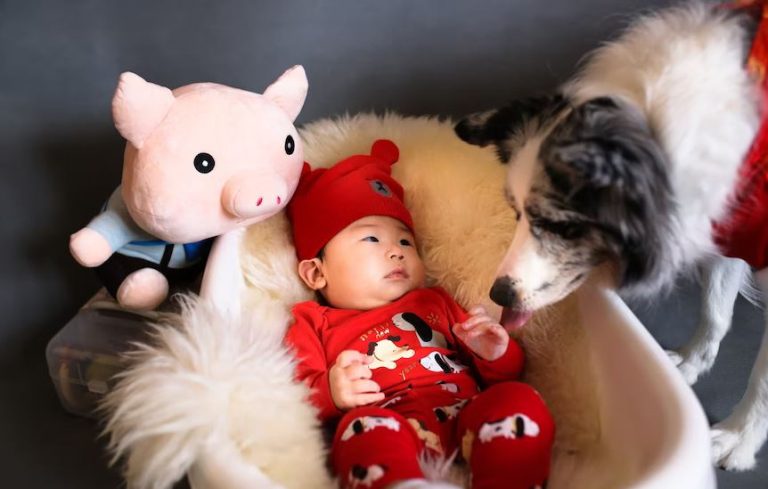The Key Milestones In Newborn Development
As a new parent, you may be wondering what to expect in terms of your baby’s development. Understanding the key milestones in newborn development can help you support your little one’s growth and provide them with the best possible start in life.
From motor skills to cognitive and language development, social and emotional growth to supporting their overall well-being, this article will guide you through the essential stages of your baby’s first year.
Note: This post may contain affiliate links, which means if you buy from my link I might make a small commission. This does not affect the price you pay. See the full affiliate disclosure here.
By gaining insight into what you can expect from each stage, you’ll be better equipped to meet your child’s needs and provide them with the love and care they need to thrive.
So let’s dive in and explore the fascinating world of newborn development together!

Understanding the Basics of Newborn Development
Get ready to explore the basics of how your newborn grows and develops during those early weeks and months.
One of the most fascinating aspects of newborn development is their reflexes. Newborns exhibit a variety of reflexes that are automatic and involuntary, such as the rooting reflex, which helps them find their mother’s nipple for feeding. Other reflexes include the grasping reflex, where they automatically grip onto objects placed in their hands, and the Moro reflex, where they throw out their arms and legs in response to sudden movements or loud noises.
Another important aspect of newborn development is sensory development. From birth, babies are using all five senses to explore and make sense of their environment.
They can see light and dark contrasts from day one but it takes a few weeks before they can focus on objects at different distances. Hearing also develops quickly with infants being able to recognize familiar voices within days after birth. Their sense of smell is well-developed too, with studies showing that newborns prefer the scent of breast milk over other smells.
By understanding these fundamentals of newborn development, you can help support your baby’s growth by engaging with them through playtime activities that will stimulate their senses and encourage healthy development overall.
Motor Skill Development
As a parent or caregiver, you may be wondering how your newborn will develop the ability to move and interact with their environment.
Motor skill development is a crucial aspect of your baby’s growth, encompassing the emergence of reflexes and the development of fine and gross motor skills.
Throughout their first year of life, your baby will reach several milestones in motor skill development that are important for their overall physical and cognitive development.

The Emergence of Reflexes
You’ll notice that your little one’s body is already programmed with reflexes to help them survive and thrive in their new world. Reflexes in infants are automatic, involuntary movements that occur in response to certain stimuli.
These primitive reflexes can be observed from birth and are essential for survival during the first few months of life. Some common reflexes include the rooting reflex, where a baby turns their head in search of food when their cheek is touched, and the grasping reflex, where a baby automatically closes their hand around an object placed in their palm.
As your baby grows and develops more control over their muscles, these primitive reflexes will gradually disappear as they become replaced by purposeful movements. However, these early reflexes play an important role in ensuring your baby’s survival and development during those crucial first few months of life.
The Development of Fine and Gross Motor Skills
Your little one is growing so quickly, developing new skills and abilities that will amaze you every day. One of the most important areas of development during this time is the growth of fine and gross motor skills.
Fine motor skills involve small movements, such as reaching for and grasping objects, while gross motor skills involve larger movements, such as rolling over and crawling.
As your baby grows and develops, they will begin to refine their muscle tone and gain better control over their movements. This improvement in muscle tone will help them to sit up on their own, crawl around the room, and eventually take their first steps.
Sensory integration is also a key part of this process – as your baby learns to coordinate their movements with what they see and feel in their environment. With practice, your little one will be able to manipulate objects with greater ease, reach for items more accurately, and eventually master more complex tasks like stacking blocks or scribbling with a crayon.
Cognitive and Language Development
The little one’s mind expands rapidly as they learn to communicate and understand the world around them. Language acquisition is a crucial aspect of newborn development, as it allows them to form connections with their caregivers and begin to grasp concepts like cause and effect.
As they progress from cooing and babbling to forming simple words and understanding basic commands, their cognitive abilities are strengthened. One key milestone in language development is the ability to understand language before being able to produce it themselves. This receptive language skill allows babies to comprehend what others are saying even if they cannot yet respond verbally.
Another important step in language acquisition is imitation, where babies start copying sounds or words that they hear from others around them. Finally, as they begin forming their own words, babies will typically start out with single syllable sounds before moving on to longer phrases and sentences over time.
By tracking these milestones in cognitive and language development, parents can better support their child’s growth during these critical early years.
Social and Emotional Development
As you delve into the topic of social and emotional development, you’ll discover three key points that are crucial to understanding this area of child development.
First, the development of social bonds is a critical aspect that shapes a child’s ability to form relationships with others.
Second, the emergence of emotions plays a significant role in how children express themselves and interact with their environment.
Finally, the development of self-regulation is essential in helping children manage their feelings and behavior as they grow and mature.
By exploring these aspects of social and emotional development, you can gain valuable insight into how children develop emotionally and socially over time.

The Development of Social Bonds
You’re probably wondering how your new baby will form social bonds with others and what factors influence this important process. The development of social bonds starts from birth, as babies have an innate ability to respond to human faces and voices.
As a newborn, your baby is able to recognize their primary caregiver’s scent and voice, which helps them feel safe and secure.
There are several factors that can influence the development of social bonds in newborns. Here are five key points to consider:
- Consistent bonding activities such as skin-to-skin contact and cuddling can help build trust between you and your baby.
- Attachment theory suggests that infants who receive responsive care from their caregivers develop a strong sense of security that can positively impact their relationships later in life.
- Babies who experience neglect or trauma may struggle with forming healthy attachments, so it’s crucial to provide a stable and loving environment for your little one.
- Social interaction with other people can also encourage the development of social skills in infants, even if they don’t fully understand what’s happening yet.
- Finally, remember that every baby is unique, so it’s important to observe your child’s cues and respond accordingly when building social connections with them.
The Emergence of Emotions
Discover how your baby’s emotional world comes to life as they begin to experience a range of emotions. From birth, babies are able to express basic emotions like joy and sadness through facial expressions, vocalizations, and body movements.
As they grow and develop, their emotional repertoire expands to include more complex feelings like fear, anger, and love.
The emergence of these emotions is influenced by both nature and nurture. According to Attachment Theory, the quality of the bond between a baby and their primary caregiver plays a crucial role in shaping their emotional development.
A secure attachment relationship provides a safe haven for the child to explore and learn about their environment while also providing a secure base from which they can venture out into the world.
Understanding your baby’s emotional needs and providing responsive care can help promote healthy emotional development that will benefit them throughout their lives.
The Development of Self-Regulation
You’ll learn how your baby can learn to manage their emotions and actions through the development of self-regulation.
As babies grow, they begin to develop self-soothing techniques that help them calm down when they’re upset or overstimulated. One common technique is sucking on their fingers, a pacifier, or a toy. Another is bringing their hands to their face and rubbing them together.
As your baby becomes more aware of their surroundings, they may become easily overwhelmed by new experiences and sensations. This is where emotional regulation strategies come into play. These strategies help your baby identify and regulate their emotions in response to different stimuli.
For example, if your baby becomes upset when you leave the room, you can teach them that you’ll always come back by giving them a reassuring smile or saying goodbye before leaving. Through consistent practice of these techniques, your baby will learn how to effectively manage their emotions and behaviors as they continue to grow and develop.

Supporting Newborn Development
It’s important to support your baby’s growth and progress during their early days of life. One way to do this is through newborn sensory stimulation. By providing stimulating experiences for your baby, you can help them learn more about the world around them and promote brain development.
You can do this by introducing different textures, sounds, and sights for your baby to explore. Another way to support your baby’s development is through tummy time. This involves placing your baby on their stomach while they are awake and supervised.
Tummy time helps strengthen neck muscles and prepares babies for crawling later on. It also allows them to explore their environment from a new perspective. To make tummy time more enjoyable for your baby, you can place toys or mirrors in front of them to encourage reaching and exploring while on their tummy.
By incorporating these practices into your daily routine, you can help set up a strong foundation for your newborn’s growth and development.
Conclusion
Congratulations on embarking on this exciting journey of newborn development! As you’ve learned, there are several key milestones in your baby’s development that will occur over the first year of life.
By understanding these stages, you can better support and encourage your little one as they grow and develop. Remember to focus on helping your baby meet their developmental goals by providing a safe and nurturing environment, engaging in interactive playtime activities, and seeking professional guidance if you have any concerns about their progress.
With your love and attention, your little one is sure to reach each milestone at their own pace and thrive in all areas of development. Enjoy the ride!






